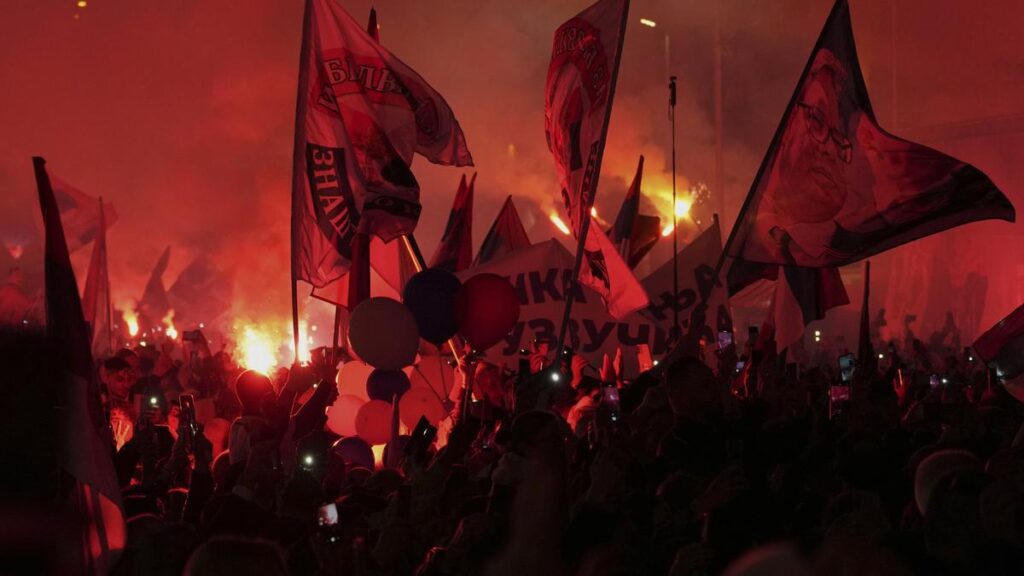Belgrade, Serbia — April 13, 2025 — Thousands of pro-government demonstrators descended on the Serbian capital on Saturday to rally in support of embattled President Aleksandar Vucic, whose hold on power is being challenged by months of escalating anti-corruption protests.

The large-scale demonstration, organized by Vucic’s Serbian Progressive Party (SNS), was staged in front of the national parliament in downtown Belgrade, effectively shutting down traffic in central parts of the city. Attendees arrived by bus from cities and towns across Serbia, Kosovo, and Bosnia, where Vucic retains substantial support among nationalist factions.
Food stalls and drink vendors lined the sidewalks as a festive—but politically charged—atmosphere unfolded in front of Serbia’s legislative building.
This pro-government rally came just weeks after a major anti-government protest on March 15, which drew over 100,000 people in the largest public demonstration in Serbia in decades. Those protests were sparked by public outrage following the collapse of a railway station roof that killed 16 people and ignited allegations of systemic corruption and government negligence.
The opposition movement has since gained momentum, drawing participation from students, teachers, farmers, and other civic groups in what has become a broad-based challenge to Vucic’s 12-year rule as prime minister and president.
In response, Vucic addressed the cheering crowd of supporters, proclaiming that the opposition’s efforts have failed.
“The colored revolution is over,” he declared defiantly. “They can walk all they want, but nothing will come from it.”
Saturday’s rally also served as a stage for the promotion of a new political initiative spearheaded by Vucic’s ruling SNS party. This unnamed political movement, expected to include other parties from the ruling coalition, aims to reinforce Vucic’s influence ahead of potential early elections. The movement has yet to be formally launched but is already being positioned as a unifying force for Serbia’s conservative base.
Adding to the spectacle, Hungarian Prime Minister Viktor Orban, a close ally of Vucic, addressed the crowd via video message. Orban’s statement was aimed at boosting nationalist sentiment and transnational right-wing solidarity.
“Serbian patriots can count on Hungarian patriots,” Orban said, drawing loud applause from the crowd.

While thousands rallied in Belgrade in support of the president, tensions flared across the country between government supporters and anti-Vucic activists.
In Novi Pazar, the administrative center of Serbia’s Muslim-majority Sandžak region, opposition activists attempted to block buses carrying Vucic’s supporters to Belgrade. Clashes were reported as protesters tried to prevent departure.
In the capital, eggs were thrown at arriving buses carrying rally-goers. Serbian police intervened to disperse the protesters and secure the arrival routes, highlighting the growing unrest and deep political divide in the country.
As the protests grow in scale and intensity, President Vucic’s political future hangs in the balance. Though he retains a strong grip on institutional power and continues to enjoy the backing of regional allies like Orban, the public backlash—fueled by mounting scandals and dissatisfaction—poses a significant challenge to his leadership.
Vucic, known for his populist rhetoric and consolidation of power, now faces a crucial test: whether state-led shows of force and support can outmatch the organic rise of public dissent.



